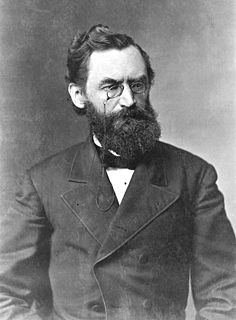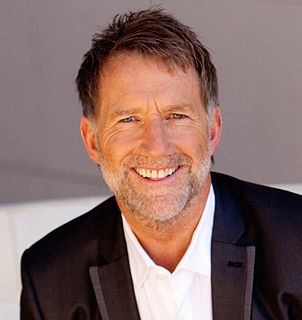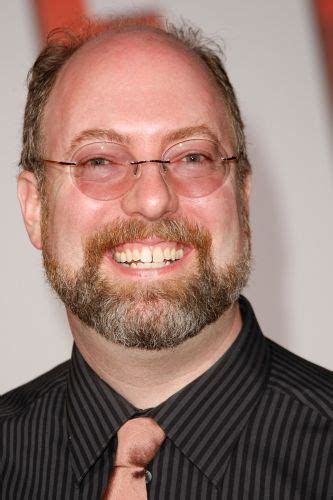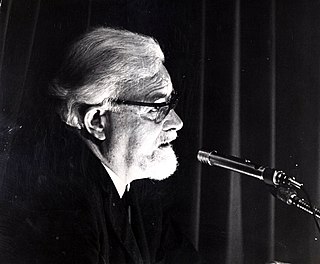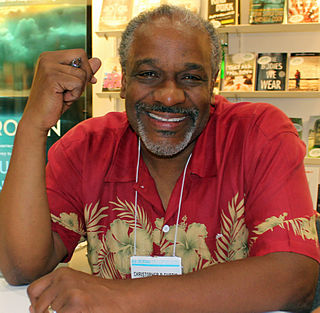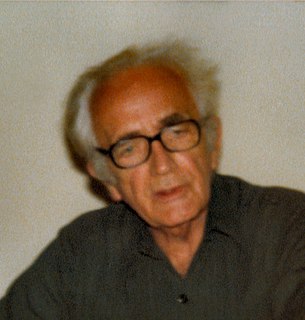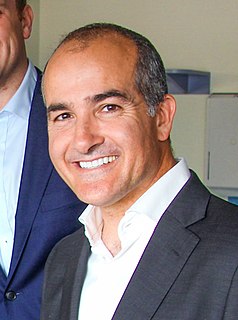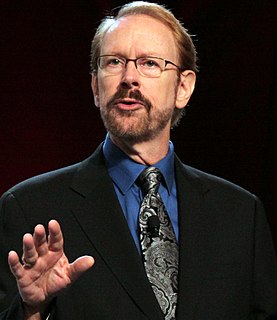Top 1200 Ideas Quotes & Sayings - Page 19
Explore popular Ideas quotes.
Last updated on April 20, 2025.
It is obvious that the great majority of humans throughout history have had grossly, even ridiculously, unrealistic concepts of the world. Man is, among many other things, the mistaken animal, the foolish animal. Other species doubtless have much more limited ideas about the world, but what ideas they do have are much less likely to be wrong and are never foolish. White cats do not denigrate black, and dogs do not ask Baal, Jehovah, or other Semitic gods to perform miracles for them.
Emile Saint-Blague had been a lively, versatile painter in his youth, but he had abused his energy by painting too many pictures; so that in what might have been the ripe period of his art he had nothing left but ideas. A man who has nothing left but ideas may be of great service to his friends, but he is of no use at all to himself. Emile was certainly an inspiration to his friends.
As an adult I discovered that I was a pretty good autodidact, and can teach myself all kind of things. And developed a great interest in a number of different things from how to build a street hot rod from the ground up to quantum mechanics, and those two different kinds of mechanics, and it was really in the sciences, quantum mechanics, molecular biology, I would begin looking at these things looking for ideas, but in fact you don't read it for ideas you read it for curiosity and interest in the subject.
People always think that loyalty is laudable. People are always saying that we must remain faithful to tradition, to family, to our class, to our ideas. Of course not! That would be equivalent to zero brain activity. If you really want to think, to seek truth, to advance intellectually, you must turn your back on clichés, on preconceived ideas - even those belonging to your spiritual family. For an intellectual, his true duty is not to fidelity, but to infidelity.
There is a particular kind of pain, elation, loneliness, and terror involved in this kind of madness. When you're high it's tremendous. The ideas and feelings are fast and frequent like shooting stars....But, somewhere, this changes. The fast ideas are far too fast, and there are far too many; overwhelming confusion replaces clarity. Everything previously moving with the grain is now against-you are irritable, angry, frightened, uncontrollable....It will never end, for madness carves its own reality.
Physics has entered a remarkable era. Ideas that were once the realm of science fiction are now entering our theoretical ? and maybe even experimental ? grasp. Brand-new theoretical discoveries about extra dimensions have irreversibly changed how particle physicists, astrophysicists, and cosmologists now think about the world. The sheer number and pace of discoveries tells us that we've most likely only scratched the surface of the wondrous possibilities that lie in store. Ideas have taken on a life of their own.
Human beings of all societies in all periods of history believe that their ideas on the nature of the real world are the most secure, and that their ideas on religion, ethics and justice are the most enlightened. Like us, they think that final knowledge is at last within reach. Like us, they pity the people in earlier ages for not knowing the true facts. Unfailingly, human beings pity their ancestors for being so ignorant and forget that their descendants will pity them for the same reason.
A man's knowledge may be said to be mature, in other words, when it has reached the most complete state of perfection to which he, as an individual, is capable of bringing it, when an exact correspondence is established between the whole of his abstract ideas and the things he has actually perceived for himself. His will mean that each of his abstract ideas rests, directly or indirectly, upon a basis of observation, which alone endows it with any real value; and also that he is able to place every observation he makes under the right abstract idea which belongs to it.
As Einstein queried, 'Why is it that I get my best ideas in the morning while I'm shaving?' Shaving is like meditation with a sharp object. When the mind is empty and receptive, big ideas flow through every cell of our body. When we're thinking too hard, we tense up and nothing can flow through us; our energy gets stuck in our heads. Sometimes you have to take a leap of faith and trust that if you turn off your head, your feet will take you where you need to go.
Sometimes listening to music can motivate you. It can. But if you're a musician, that isn't always the way to get new ideas because you don't want to take somebody else's ideas. You need to find your own. So if you go to different artistic mediums, whether it's dance or it's visual arts or films or books, stories, sometimes it gets you hearing things, hearing progressions that you wouldn't come up with if you were just listening to other music because you don't want to copy progressions you've just heard.
When...did it become irrational to dislike religion, any religion, even to dislike it vehemently? When did reason get redescribed as unreason? When were the fairy stories of the superstitious placed above criticism, beyond satire? A religion was not a race. It was an idea, and ideas stood (or fell) because they were strong enough (or too weak) to withstand criticism, not because they were shielded from it. Strong ideas welcomed dissent.
You grow the fastest by getting... adopting ideas and technologies from other cultures. And that has been proven in history, time and time again. Whether you go back to the ancient Persians, or the Romans, or the Ottomans. It's how a culture grows, by incorporating other ideas and going, wow, how did they do this? Oh, I bet you this works with this, and then you can improve it again. So I think any culture that sort of says, no no no, it's just us, nobody gets in anymore, it's the beginning of atrophy, and the rest of the world will just pass you.
Ideas are like stars; you will not succeed in touching them with your hands. But like the seafaring man in the desert of waters, you choose them as your guides, and following them you will reach you destiny. Perhaps you could get a clearer idea of our destiny if we took time out to examine our ideas, and upgraded them if necessary. What things are most important to you? If you could do anything you wanted to be, what would you be? If you could achieve a single objective in life, what would it be?
I find so many people struggling, often working harder, simply because they cling to old ideas. They want things to be the way they were; they resist change. I know people who are losing their jobs or their houses, and they blame technology or the economy or their boss. Sadly they fail to realize that they might be the problem. Old ideas are their biggest liability. It is a liability simply because they fail to realize that while that idea or way of doing something was an asset yesterday, yesterday is gone.
You know, an idea is just an idea. There seems to... the kind of epiphanies that you have, like the little sudden bursts of light, they're very small and they're very short and it's the pursuit of the idea that's the important thing. . . . I know a lot of people who have way better ideas than I do that-much more frequently than I do that just can't sit down and actually do it. Ideas are such are a little overrated really; it's the work behind the idea that's the important thing.
You're the hero of your own story. I had let go of my own story from my own childhood and whatever anger I had and I began to see it from a very different place. It's really easy to be like "This thing happened to me! Look what they did to me or are doing to me." These are such powerful ideas and it's so easy to hold onto them forever. When I let go of those ideas it was easier to see my childhood from different points of view.
There is an interesting and new way to be excited about the fashion world today maybe. The traditional path of fashion as simple magazine images has dissolved - we are seeing new and innovative ways to share, create, and enjoy ideas. I am challenged to learn and explore paths of finding new photographers, stylists, and vision-makers online or through direct contact, connecting with ideas and creativity in new ways, and making images with different outlets. Sometimes more unbridled avenues and unconventional ways lead to things I wouldn't have thought of yet.
Abraham Lincoln did have intellectual instincts, a tremendous curiosity on a broad range of subjects, and a near-photographic memory for what he read. He was, at the end of the day, a politician: politics were his heaven, said William Herndon. But Lincoln did take comfort in ideas and books, more so than almost any other president, and he went to books and ideas in moments of perplexity to sort things out. Philosopher, no, but thoughtful and "surprisingly well-read" for his day.
Anarcho-capitalism, in my opinion, is a doctrinal system which, if ever implemented, would lead to forms of tyranny and oppression that have few counterparts in human history. There isn't the slightest possibility that its (in my view, horrendous) ideas would be implemented, because they would quickly destroy any society that made this colossal error. The idea of 'free contract' between the potentate and his starving subject is a sick joke, perhaps worth some moments in an academic seminar exploring the consequences of (in my view, absurd) ideas, but nowhere else.
Why did the consensus of Christian churches not only accept these astonishing views but establish them as the only true form of Christian doctrine? . . . these religious debates - questions of the nature of God, or of Christ - simultaneously bear social and political implications that are crucial to the development of Christianity as an institutional religion. In simplest terms, ideas which bear implications contrary to that development come to be labeled as 'heresy'; ideas which implicitly support it become 'orthodox.'
What I want to argue for is not that we should give up on our ideas of success, but that we should make sure that they are our own. We should focus in on our ideas and make sure that we own them, that we're truly the authors of our own ambitions. Because it's bad enough not getting what you want, but it's even worse to have an idea of what it is you want and find out at the end of the journey that it isn't, in fact, what you wanted all along.
The full implications of feminism will evolve over time, as we organize, experiment, think, analyze, and revise our ideas and strategies in light of our experiences. No theory emerges in full detail overnight; the dominant theories of our day have expanded and changed over many decades. That it will take time should not discourage us. That we might fail to pursue our ideas - given the enormous need for them in society today - is unconscionable.
Good ideas are not good enough. They need to be God ideas. Just because someone else’s methods work does not mean they will work for us. God plants a unique set of gifts within each of us as leaders, enabling us to do a particular work for Him in a particular way. If we deny those, opting for something else that appeals to us, we forsake the means by which God wants to give us success (1Timothy 4:14).
Of course, even if the directors like my ideas or the designs I do, they may end up changing the story so much, that those characters have to change, or get cut out altogether, and that's just the way it is. Sometimes the directors are designers themselves, or they want to work with a character designer who will do things in their own distinct way - sometimes the most important thing I do is figure out what they don't want to do, by experimenting. Either way, whether they use my ideas or not, I get paid, so it's all good.
Our character is composed of our ideas and our feelings: and, since it has been proved that we give ourselves neither feelings nor ideas, our character does not depend on us. If it did depend on us, there is nobody who would not be perfect. If one does not reflect, one thinks oneself master of everything; but when one does reflect, one realizes that one is master of nothing
Writin songs is like a mystery. The most difficult thing to do is have a good idea. If you have a decent idea, the songs are the easy part. Actually having something to say is the hard part. If you get an idea for a song, then it pulls you along. There are just some ideas that you get that are really hard to edit out; it's hard to stop thinking about some bad ideas. So you just finish it and you end up putting it on a record.
Henry's universe was modeled on the highball. It was a mixture in which half a pint of the fizziest philosophical and scientific ideas all but drowned a small jigger of immediate experience, most of it strictly sexual. Broken reeds are seldom good mixers. They're far too busy with their ideas, their sensuality and their psychosomatic complaints to be able to take an interest in other people - even their own wives and children. They live in a state of the most profound voluntary ignorance, not knowing anything about anybody, but abounding in preconceived opinions about everything.
Nobody can be saved from anything, unless they save themselves. It is hopeless doing things for people - it is often very dangerous to do things at all - and the only thing worth doing for the race is to increase its stock of ideas. Then, if you make available a larger stock, people are at liberty to help themselves from out of it. By this process the means of improvement is offered, to be accepted or rejected freely, and there is a faint hope of progress in the course of millennia. Such is the business of the philosopher, to open new ideas. It is not his business to impose them on people.
Just getting totally absorbed in that and therefore when I came back around to [Buckminster Fuller] and found that much of it was made up, I realized that nevertheless, it really was crucial, crucial for how he understood himself, I believe, and certainly crucial for how anyone else ever engaged in his ideas and therefore as a starting point, how can we engage in his ideas today, but with a remove of knowing that it is a myth and being able to navigate it in that sort of level, at that level of reading him as a story.
I've known people who had fantastic ideas, but who couldn't get the idea off the ground because they approached everything weakly. They thought that their ideas would somehow take off by themselves, or that just coming up with an idea was enough. Let me tell you something - it's not enough. It will never be enough. You have to put the idea into action. If you don't have the motivation and the enthusiasm, your great idea will simply sit on top of your desk or inside your head and go nowhere.
With God's help, I've not had a drink in nine and a half years. That's my whole story right there. And because of that, I'm doing this. I'm making records, I'm touring. I was so involved in just getting brain damaged, I wasn't doing anything. I had great ideas, many notebooks filled with notes, some of them I can read and some of them I just can't read, but I really didn't do anything constructive, it was all just good ideas. Now I'm trying to lead a constructive life a day at a time.
The quality of light by which we scrutinize our lives has direct bearing upon the product which we live, and upon the changes which we hope to bring about through those lives. It is within this light that we form those ideas by which we pursue our magic and make it realized. This is poetry as illumination, for it is through poetry that we give name to those ideas which are, until the poem, nameless and formless-about to be birthed, but already felt.
It's great to create a story and then to submit it to your editor and see what her reaction is to it. It's great to have your editor tell what her suggestions and ideas for the story are. It's great to explain to your editor why her ideas and suggestions are bizarre and to ask her why is she trying to ruin my story.
I was the first person that had been so kind to Iman Abdulmajid. As time went on, and she became successful, signed with an agency, when she had to make big decisions, she wouldn't always talk to an agent, she'd ask me. I'd give her good advice and she'd be on her way. When I had ideas to do things like the Black Girls Coalition, I would always talk to her, she always loved my ideas. She trusts me.
Seriously. It was running out at Rolling Stone. First of all, they didn't feel the need for a dissident conservative voice in a world where certain conservative aspects had become intellectually dominant. I would actually argue against that, but on the surface of it, in the [Bill] Clinton years the market economy triumphed, certain libertarian ideas became ordinary, and certain early-20th-century ideas about centralization of government and economic planning and socialism with a small "s" had obviously gone out the window. The Cold War was over, blah blah blah.
Change masters are - literally - the right people in the right place at the right time. The right people are the ones with the ideas that move beyond the organization's established practice, ideas they can form into visions. The right places are the integrative environments that support innovation, encourage the building of coalitions and teams to support and implement visions. The right times are those moments in the flow of organizational history when it is possible to reconstruct reality on the basis on accumulated innovations to shape a more productive and successful future.
Nothing motivates like success. While academics, consultants and gurus are preoccupied with coming up with great insights and seminal ideas, usually they don't realize that making things happen, achieving operational excellence, moving the organization from uncertainty to clarity, from red ink to black, is what really creates hope for a better future. Therefore, great leadership always involves great ideas and real actions that reinforce a strong belief in the excellence of the decision makers and in the viability of the organization itself.
We must have a new mythology, but it must place itself at the service of ideas, it must become a mythology of reason. Mythology must become philosophical, so that the people may become rational, and philosophy must become mythological, so that philosophers may become sensible. If we do not give ideas a form that is aesthetic, i.e., mythological, they will hold no interest for people.
We're free out here, really free for the first time. We're floating, literally. Gravity can't bow our backs or break our arches or tame our ideas. You know, it's only out here that stupid people like us can really think. The weightlessness gets our thoughts and we can sort them. Ideas grow out here like nowhere else - it's the right environment for them. Anyone can get into space, if he wants to hard enough. The ticket is a dream.
The answer is for all of us to create our own systems, our own ideas, because vibrant independent ideas will trump this corporate, plastic Borg, this brainwashing they're trying to push. I mean, banning 'father' and 'mother,' banning the word 'husband' and 'wife,' I mean that's so cultic that if I'd of been told ten years ago they were gonna ban words like that, I wouldn't have believed it. They do it with straight faces. I mean, has the left, and of course the controlled-right as well, have they gone collectively insane on a control-freak bent? Or, is there a strategy?
Only simple ideas can be held by large groups of people. Commonly held ideas are almost always dumbed down until they are practically lies... and often dangerous ones. Once vast numbers of people have come to believe the lie, they adjust their own behavior to bring themselves into sync with it, and thereby change the world itself. The world, then, no longer resembles the one that gave rise to the original insight. Soon, a person's situation is so at odds with the world as it really is that a crisis develops, and he or she must seek a new metaphor for explanation and guidance.
An isolated person requires correspondence as a means of seeing his ideas as others see them, and thus guarding against the dogmatisms and extravagances of solitary and uncorrected speculation. No man can learn to reason and appraise from a mere perusal of the writing of others. If he live not in the world, where he can observe the public at first hand and be directed toward solid reality by the force of conversation and spoken debate, then he must sharpen his discrimination and regulate his perceptive balance by an equivalent exchange of ideas in epistolary form.
Things that people thought not possible when they were proposed and blown off become enormously successful. There are a lot of ideas that never succeed - but we all know the crazy ideas that did - who would have thought 30 years ago that people would pay $4 for a cup of coffee - but today, we have 20,000 Starbucks stores around the world. A group of prospective investors once remarked that "Google" was the "balloon company." The point is, don't rush to pooh-pooh something you don't understand or aren't willing to try - it could be something that changes the world.
We live in a supermarket of ideas, faiths, practices, theories, ideologies, and much else besides. Never in human history have there been so many movements and ideas struggling to attract our attention. Added to this, the Western world is swamped by material goods and the Western mind is dominated by the goal of material success. In all this confusion, Zen stands out as a voice of sanity. It represents a different way of seeing the world, one based upon the rediscovery of who we really are and have always been, through revealing to us our true nature.
The public needs art, and it is the responsibility of a ’self-proclaimed artist’ to realize the public needs art, and not to make bourgeois art for the few and ignore the masses. … I am interested in making art to be experienced and explored by as many individuals as possible with as many different individual ideas about the given piece with no final meaning attached. The viewer creates the reality, the meaning, the conception of the piece. I am merely a middleman trying to bring ideas together.
Art schools are partly the villain here. (Never mind that I teach in them.) This generation of artists is the first to have been so widely credentialed, and its young members so fetishize the work beloved by their teachers that their work ceases to talk about anything else. Instead of enlarging our view of being human, it contains safe rehashing of received ideas about received ideas. This is a melancholy romance with artistic ruins, homesickness for a bygone era. This yearning may be earnest, but it stunts their work, and by turn the broader culture.
Proselytism is solemn nonsense, it makes no sense. We need to get to know each other, listen to each other and improve our knowledge of the world around us. Sometimes after a meeting I want to arrange another one because new ideas are born and I discover new needs. This is important: to get to know people, listen, expand the circle of ideas. The world is crisscrossed by roads that come closer together and move apart, but the important thing is that they lead towards the Good.
If your mind is open to opposing ideas, your intelligence will go up. If your mind is closed to opposing ideas, your ignorance is in control. Intelligence or ignorance? Your ability to keep an open mind and appreciate multiple points of view is conscious choice. And one that can open your world, and shape your childs future.
Science is much more than a body of knowledge. It is a way of thinking. This is central to its success. Science invites us to let the facts in, even when they don't conform to our preconceptions. It counsels us to carry alternative hypotheses in our heads and see which ones best match the facts. It urges on us a fine balance between no-holds-barred openness to new ideas, however heretical, and the most rigorous skeptical scrutiny of everything - new ideas and established wisdom.
What is the influence of Sun Tzu in the world today? Perhaps there are others who are better qualified than I to speculate about that question. Sun Tzu's ideas, as expressed in his famous treatise, have undoubtedly influenced the nature of many revolutionary movements that are arrayed against more powerful forces, and in some cases - as in Vietnam - have played a useful role in bringing about success. But such ideas are always in conflict with other deepseated emotional factors, which propel dissident movements into the rampant use of terrorism and other forms of anarchistic struggle.
In the art of teaching, we recognize that ideas and insights need to cook over a period of time.
Sometimes the student who is least articulate about expressing the ideas is in fact the one who is absorbing
and processing them most deeply. This applies as well to our own private learning of our art form; the
areas in which we feel most stuck and most incompetent may be our richest gold mine of developing
material. The use of silence in teaching then becomes very powerful.
The move from scarcity thinking to abundance thinking, from zero-sum competition to one-hundred-sum collaboration, is not just a “nice” or “moral” idea. In the twenty-first century, it's plain good sense. Scarcity says, “I'm going to keep all my ideas to myself and sell more than anyone else.” Abundance says, “By mentoring, coaching, and sharing all our best ideas, we're going to create a powerful tide that raises all our ships-and we'll all sell more as a result".













